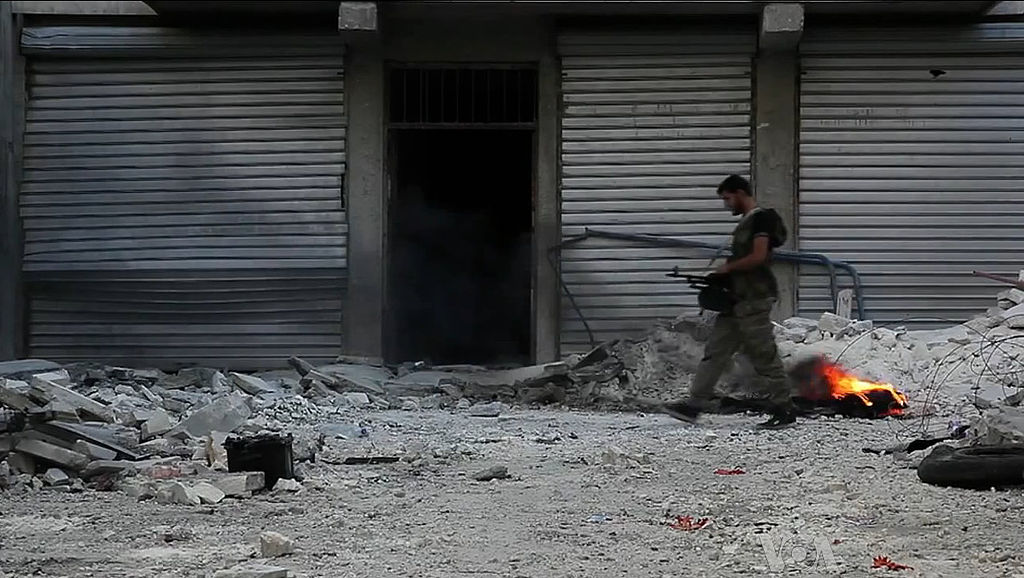It’s the late morning, and my wife Mardena and I are headed back to our hostel in Antalya, a city on Anatolia’s southwestern coast. We’ve just returned from a trip to the archeological museum, where we saw a stunning display of Roman mosaics set out under clear glass walkways. As we duck out of the 111-degree heat and into the hostel’s lobby, we come upon a young man, probably in his early twenties, standing with his head craned forward and eyes fixed on a TV mounted high on the wall. A Turkish news report is discussing the war raging in neighboring Syria. The camera footage shows smoke, rubble, and bombed-out buildings, but I have no idea what the reporter is saying. I ask the young man what is happening. “Assad is bombing Homs,” he says, his eyes still on the screen.
“My family is there,” he adds. “I haven’t been able to talk to them.” He speaks in a flat, almost stoic, tone, with a slight accent to his English. “My sister lives in Homs, but she can’t go out. She’s stuck in her apartment. She can’t get to my parents’ house.”
He glances at us, then turns his eyes back to the TV. “Hezbollah won’t let Syrian refugees into Lebanon,” he says. He pauses a moment, then adds, “Syria would not do that. Syrians are generous people.”*
I remember seeing the young man that morning on the breakfast patio, setting the cups and utensils on the tables and putting out a spread of rolls, cheese, watermelon, cucumbers, and tomatoes. He apparently sleeps in a small room off the lobby. The hostel is pretty basic; I doubt he earns much beyond room and board.
The next morning, Mardena and I sit on the patio drinking tea. We plan to visit Patara, a small village a few hours down the coast. Even after reading the guidebooks, though, I’m still not clear about the best way to get there.
The young man is moving about the patio, collecting dishes and cleaning tables. Now and then he stops to talk to a pretty young backpacker a few tables away from us. Eventually, he comes over and greets us. We chat a bit, and I mention we’re thinking about taking the bus to Patara later that morning.
“You should take the minibus,” he says. “It’s faster than the bus. If you want, I can take you to the stop after I clean up.”
I look at Mardena. She shrugs a little and nods.
A half hour later, we all pack into the hostel manager’s Volkswagen. While we wind our way through Antalya’s labyrinthine old town, I ask the boy where he learned English. “I majored in English literature in college,” he says.
Mardena, who used to teach English, leans forward in her seat. “Why’d you major in English?”
“My parents own a hotel in Homs,” he replies. “English is good for the tourism industry.” A few months ago he left Syria to visit a friend in England, he adds. “While I was coming back, the war started. My parents told me not to come home yet, so I stopped here and found this job.” He had been to Antalya once before, a few years ago, he adds. “Things are much better organized now.”
Before long, we pull up next to a bus-stop enclosure alongside a two-lane highway on the outskirts of town. Three people have squeezed into the tiny space to shade themselves from the sun.
We all get out, and the young man pulls our backpacks from the trunk. “How much?” I ask as he sets them down next to us. Ten Turkish lira, he says. I give him twenty. He reaches into his pocket for the change, but I tell him to keep it. “Oh … teşekkür,” he says, quietly. He places his hand on his chest and bows slightly.
We wave as he drives off. Then Mardena and I stand and wait outside the bus enclosure. Cars and trucks speed by, kicking up dust. The sun feels relentless, every bit as hot as it was the day before.
Occasionally now, five years later, I’ll see a news report on TV that mentions Homs—which Syrians opposed to Assad have long since left, just as they are evacuating from Aleppo today. I think of the young man and wonder if he’s still waiting in Antalya.
* At the time, Hezbollah, a Lebanese Shia group, had recently joined the Alawite Shia forces loyal to Syrian president Bashar al-Assad, fighting against Sunni rebels opposed to the regime. As the war has dragged on, Lebanon has taken in large numbers of Syrian refugees, both Sunni and Shia.
Paul Michelson Paul Michelson lives and writes in Davis, California.
- Follow us on Twitter: @inthefray
- Comment on stories or like us on Facebook
- Subscribe to our free email newsletter
- Send us your writing, photography, or artwork
- Republish our Creative Commons-licensed content

